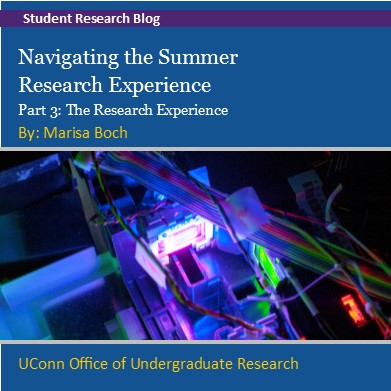By: Marisa Boch, OUR Peer Research Ambassador
The Research Experience
It may be your first time doing full-time research, and 8 hours of lab each day may seem daunting at first. The best way to ease those nerves is to know what to expect…
Typically, you will be assigned to a PI and will be working most closely with a graduate student on a specific project. You may begin the first week or two conducting literature review in order to plan the study (experimental aims, experimental methods, methods of analysis, etc.) while also learning basic laboratory techniques/procedures. In my experience, once my graduate student and I finished putting together the formal study outline, I then presented the outline to my PI to get feedback. These first few weeks may be more deskwork than laboratory work, but becoming proficient at conducting literature searches and learning how to plan out all aspects of a study are valuable skills!
Once the study plan is established, you will continue learning basic and complex laboratory techniques to achieve your experimental goals. There may be down time while setting up a study. On those days, keep yourself busy with literature review; learn as much as you can! When that down time happens during the middle/end of the internship, use it to stay up to date with data analysis and writing in your lab journal (Aside: write everything in your lab journal). Especially by the end of the 10 weeks, data analysis will be an extremely important task. You will learn proper ways to analyze data and assess statistical significance.
After completing your study, you will likely have the opportunity to present your research in the form of a poster session or PowerPoint presentation. The final deliverable will likely include background information, methods, results, analysis, and conclusions, and your graduate student and PI will likely work closely with you to prepare for the presentation. Presenting your research is almost as important a skill as conducting the research itself!
When you are not doing traditional research tasks, you may also have the opportunity to get a glimpse into graduate school. There will be opportunities to attend research seminars or graduate student panels. Use every experience from the summer research program to help you decide if grad school may be for you!
Reflecting on Your Experience
You just experienced 10 weeks being a full-time researcher. You felt like a scientist. Now what?
After your full-time research experience, you will be blown away by how much you have learned, in terms of both scientific knowledge and laboratory and critical thinking skills, and how much you have accomplished. After both of my summer research experiences, I could not believe how many pages in my lab notebook I had filled (“This was more than I accomplished all last semester!”). In fact, it may even be difficult to adjust to the Fall semester, when you are squeezing in your ~9 hours in lab between classes and on-campus jobs and extracurricular activities.
In addition to gaining new knowledge and skills, by the end of your summer research experience, you will have made close connections with members of your laboratory. Although not required, writing a thank you note to your PI and your grad student to tell them how much you appreciated their close mentorship throughout the program is always a nice touch, as these are personal and professional connections you do not want to lose!
Once you complete the research experience, you should give yourself time for reflection. Is full-time research something you could see yourself doing? What skills did you get out of the experience that you will continue using in the future, whether or not your future includes a research career? Update your resume to include details of your laboratory experience and the newly acquired skills. After such a fulfilling experience, prepare an elevator pitch of how to talk to future employers or admissions committees about your experience.
When you make the most of your summer research experience, it will surely pave the way to endless other opportunities!
Check out the previous segments in this special 3-part blog:
Marisa Boch is a senior double majoring in Chemical Engineering and Molecular & Cell Biology. Click here to learn more about Marisa.